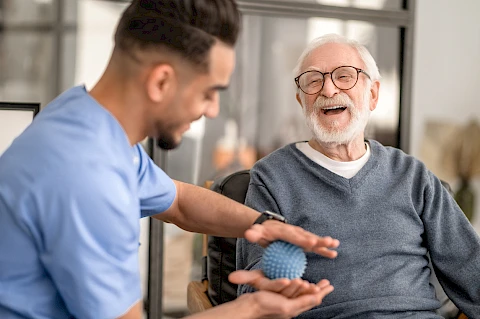
Parkinson's disease is a progressive neurological disorder that affects movement and can significantly impact daily living. For seniors with Parkinson's, simple tasks such as buttoning a shirt or using utensils can become challenging. This is where occupational therapy (OT) comes in. OT plays a vital role in managing Parkinson's symptoms and improving quality of life.
Senior Helpers Warren will empower caregivers with the knowledge and tools needed to support the occupational therapy process for their senior loved ones. By understanding how OT works and how you can reinforce it at home, you can help maintain your loved one's independence and dignity.
Occupational Therapy in Parkinson's Care
Occupational therapy is a type of therapy designed to help people carry out daily activities. It's not just exercise; it's a focused approach to teach or reteach skills essential for everyday living. For seniors with Parkinson's, OT helps maintain independence by addressing physical and cognitive challenges.
Occupational therapists work with people to improve their ability to perform everyday tasks despite the limitations caused by Parkinson's disease. Whether it's getting dressed, cooking a meal, or engaging in hobbies, OT aims to make these activities manageable and enjoyable.
Common OT Interventions for Parkinson's
There are several common occupational therapy interventions used for seniors with Parkinson's. Each is tailored to meet individual needs and improve daily functioning.
- Fine Motor Skills: Therapists use exercises to improve hand-eye coordination and dexterity, making it easier for seniors to perform tasks like writing or fastening buttons.
- Balance Training: Many with Parkinson's face balance issues. Therapists work on exercises to enhance stability, reducing the risk of falls.
- Adaptive Techniques: Occupational therapists teach strategies to perform tasks differently or modify tasks for easier completion.
Assistive devices and modifications in the home also play a critical role. Simple tools like weighted utensils or grab bars in the shower can make life easier and safer.
The Caregiver's Role in Supporting OT
As a caregiver, you are an essential part of the therapy process. To support and reinforce occupational therapy strategies at home, it is necessary to encourage consistency by incorporating therapy activities into a regular part of the daily routine. This helps reinforce learning and strengthens skills.
Engage positively by encouraging participation without pressure and celebrating small victories to keep motivation high. Regular communication with your loved one's occupational therapist is important. Share observations and ask for personalized tips to address specific challenges at home.
Benefits of OT for Seniors With Parkinson's
The benefits of occupational therapy for seniors with Parkinson's are significant. By enhancing fine motor skills, improving mobility, and adapting tasks to fit current abilities, OT promotes independence and a higher quality of life. Reducing the risk of falls is another crucial benefit of occupational therapy. By improving balance and coordination, seniors can move more confidently and safely around their homes.
Aside from physical benefits, OT also offers emotional and psychological perks. Mastering daily tasks can build confidence and reduce frustration. This not only benefits seniors but also caregivers who often face their own emotional challenges.
Discover Compassionate Senior Care Services
Occupational therapy is an important part of caring for a senior with Parkinson's. It's not just a set of exercises; it's a pathway to greater independence and improved quality of life. By being involved in the therapy process and supporting your loved ones in their journey, caregivers can make a significant impact.
For those in Erie, Warren, Millcreek, Fairview, and Clarendon, contact us at Senior Helpers Warren for guidance and support. Our experienced team can offer personalized strategies to manage Parkinson's care effectively, helping both seniors and caregivers live more fulfilling lives.